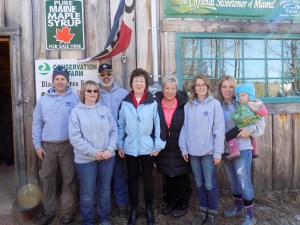WILTON — U.S. Sen. Susan Collins, R-Maine, on Saturday visited Black Acres where she was recognized for her leadership in Congress on climate change.
State Rep. Russell Black, R-Wilton, his wife, Susan, and their family open their maple syrup operation each year. Visitors learn how the sweet topping is made, sample foods made with the syrup and visit the farm animals.
Black explained to Collins how his evaporator works. About 40 gallons of sap are needed to produce 1 gallon of syrup, he said.
Collins sampled syrup and maple baked beans.
Black showed Collins his new evaporator which will be much more efficient. He bought the equipment from Miguel Ibarguen of Bowley Brook Maple.
Bowley Brook Maple is building a new equipment facility, the first of its kind in Maine, on Routes 2 and 4, Ibarguen told Collins. Materials will be carried for the very smallest to the largest producer.
Black taps 1,200 trees and is expanding all the time. He tapped with his dad and bought his grandfather’s farm in 1963.
Producers used to start tapping around March 10 and start boiling eight to 10 days later, Black said. Twenty-five-degree nights and 45-degree days are ideal for sap to run; however, extremities in weather have been increasing over the years.
“Today, we start tapping in January,”Black said. “This year there were sap runs in December, January and February. Producers in southern Maine are even making syrup in late December.”
The unpredictability of weather patterns is affecting all areas of farming today. Many hours of labor and thousands of dollars have been spent on repairing access roads and replacing culverts in the maple syrup operation, Black said.
“I had hoped to turn the operation over to my sons and daughters but am beginning to wonder if I’ll be able to do that,” Black said.
Collins said two issues are affecting the state’s maple syrup industry: false labeling and changes in climate. Collins and other senators have asked the Food and Drug Administration to investigate those who label artificial maple syrup as being pure.
“That can hurt the industry here in Maine and New England,” she said.
“Climate change affects maple syrup, other agricultural production, and the fishing and forestry industries,” she said. “I am working with Beth Ahearn of Maine Conservation Voters, farmers and others to come up with common-sense solutions to help ensure we preserve our way of life in Maine. “
Ahearn thanked Collins for her support of the U.S. Environmental Protection Agency’s Clean Power Plan when it was challenged by the Senate.
Other initiatives supported by Collins are the Green Climate Fund, a “Super Pollutants” bill and the “Clean Cookstoves and Fuels Support Act.”
“We are grateful for Sen. Collins’ actions,” Ahearn said.
A hay wagon then took Collins and other guests to visit the farm animals.




Comments are no longer available on this story